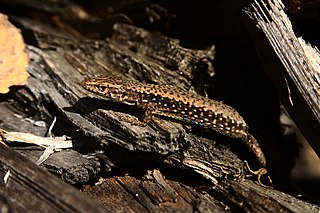
Darevskia is a genus of wall lizards of the family Lacertidae. Member species are native to the Caucasus, Iran and Turkey, living in forest and grassy habitats with numerous rock outcrops. Among rock lizards, seven parthenogenetic species are known.

Lacerta is a genus of lizards of the family Lacertidae.

Proteus mirabilis is a Gram-negative, facultatively anaerobic, rod-shaped bacterium. It shows swarming motility and urease activity. P. mirabilis causes 90% of all Proteus infections in humans. It is widely distributed in soil and water. Proteus mirabilis can migrate across the surface of solid media or devices using a type of cooperative group motility called swarming. Proteus mirabilis is most frequently associated with infections of the urinary tract, especially in complicated or catheter-associated urinary tract infections.

Nepenthes mirabilis, or the common swamp pitcher-plant and tropical pitcher plant, is a carnivorous plant species. By far the most widespread of all Nepenthes, its range covers continental Southeast Asia and all major islands of the Malay Archipelago, stretching from China in the north to Australia in the south. The species exhibits great variability throughout its range. One of the more notable varieties, N. mirabilis var. echinostoma, is endemic to Borneo and possesses an extremely wide peristome.

The Bzyb or Bzipi is one of the two largest rivers of Abkhazia and the twelfth longest river in Georgia. The river valley has rich biodiversity of herbaceous garden plants, particularly in the gorge section in the upper reaches where the most prominent and colourful bellflower Campanula mirabilis with profuse growth of 100 flowers per plant is given the name, the "Queen of the Abkhazian flora". During 1904-1917 it served as the border between the Russian Empire's Sukhumi Okrug and the Black Sea Governorate.

Darevskia armeniaca, commonly known as the Armenian lizard or the Armenian rock lizard, is a parthenogenetic species of Darevskia, a genus of lizards belonging to the family Lacertidae, the wall lizards. Darevskia armeniaca is native to the Armenian Highland.

Darevskia alpina is a species of lizard in the family Lacertidae. It is found in the Greater Caucasus in Georgia and Russia.

Darevskia caucasica is a lizard species in the family Lacertidae. It is found in the Caucasus Mountains of Georgia, southern Russia, and Azerbaijan.

Darevskia derjugini is a species of lizard in the family Lacertidae. The species is native to Southeast Europe and Western Asia. There are six recognized subspecies.
Darevskia dryada, the Charnali lizard, is a lizard species in the genus Darevskia. It is found in Georgia and Turkey.

Darevskia lindholmi is a lizard species in the genus Darevskia. It is endemic to Ukraine.

Darevskia mixta is a lizard species in the genus Darevskia. It is endemic to Georgia.
Darevskia parvula, the red-bellied lizard, is a lizard species in the genus Darevskia. It is found in Georgia and Turkey.

Darevskia praticola, the meadow lizard, is a lizard species in the genus Darevskia. It is found in Georgia, Russia, Iran, Serbia, Bulgaria, Romania, Greece, Azerbaijan, Armenia, and Turkey.

Darevskia raddei, known commonly as the Azerbaijan lizard, is a species of lizard in the family Lacertidae. The species is endemic to Eurasia. There are three subspecies.

Darevskia rudis is a lizard species in the family Lacertidae. It is found in the Caucasus and northern coastal Turkey.
Darevskia saxicola is a lizard species in the genus Darevskia. It is found in Georgia, Russia, and Turkey.

Darevskia valentini, also known commonly as the Caucasian rock lizard or Valentin's lizard, is a species of lizard in the family Lacertidae. The species is native to southeastern Europe and western Asia. There are three recognized subspecies.
Mykola Mykolaiovych Szczerbak was a Ukrainian zoologist and ecologist, a prolific herpetologist, a full professor, and a Corresponding Member of the National Academy of Sciences of Ukraine.














